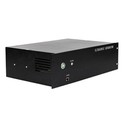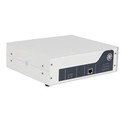Hey there! As a supplier of ultrasonic tank filters, I often get asked if there are any certifications for high - quality ultrasonic tank filters. Well, let's dive right into this topic.
First off, what exactly are ultrasonic tank filters? Ultrasonic tank filters, like the ones you can check out at Ultrasonic Tank Filter, are essential components in ultrasonic cleaning systems. They help to remove contaminants from the cleaning solution in the tank, ensuring that the ultrasonic cleaning process is effective and efficient.
Now, when it comes to certifications, there are indeed several important ones in the industry. One of the most well - known certifications is ISO 9001. This certification is all about quality management systems. A company that has ISO 9001 certification for its ultrasonic tank filters has demonstrated that it has a well - defined quality management process in place. This means that from the design stage to the manufacturing and after - sales service, every step is carefully monitored to ensure that the filters meet high - quality standards.
For example, during the design phase, the company with ISO 9001 certification will conduct thorough research and development to optimize the filter's performance. They'll consider factors like the type of contaminants the filter needs to remove, the flow rate of the cleaning solution, and the durability of the filter materials. In the manufacturing process, strict quality control measures are implemented. This includes regular inspections of raw materials, in - process checks during production, and final product testing before the filters are shipped out.
Another important certification is NSF/ANSI 61. This certification is related to the safety of drinking water systems and components. Although ultrasonic tank filters are not typically used in drinking water applications directly, this certification can still be relevant in some cases. If the cleaning solution used in the ultrasonic tank is water - based and there's a possibility of cross - contamination with drinking water systems, having NSF/ANSI 61 certification for the filters provides an extra layer of assurance that the filters won't introduce harmful substances into the water.
The NSF/ANSI 61 certification process involves rigorous testing of the filter materials and components. The filters are tested for their ability to leach harmful chemicals into the water, as well as their mechanical and structural integrity. If a filter passes these tests, it means that it meets the strict safety standards set by the certification body.
There's also the CE certification. This is a European Union (EU) certification that indicates the product meets the EU's health, safety, and environmental protection requirements. If you're planning to sell your ultrasonic tank filters in the EU market, having the CE certification is a must. The CE certification process involves a self - declaration by the manufacturer, stating that the product meets the relevant EU directives. However, this doesn't mean that there's no testing involved. The manufacturer is responsible for ensuring that the product has undergone appropriate testing, either in - house or by a third - party testing laboratory.
When it comes to ultrasonic tank filters, the CE certification ensures that the filters are safe to use, won't cause any electrical hazards (if they have electrical components), and comply with environmental regulations regarding the disposal of the filters at the end of their life cycle.


So, why do these certifications matter for customers? Well, for starters, certifications are a sign of trust. When a customer sees that an ultrasonic tank filter has one or more of these certifications, they can be more confident in the quality and safety of the product. It reduces the risk of buying a sub - standard filter that might not perform well or could even pose a safety hazard.
Certifications also play a role in compliance. In some industries, there are regulatory requirements that mandate the use of certified products. For example, in the medical device manufacturing industry, where strict cleanliness standards are in place, using certified ultrasonic tank filters can help companies meet these regulatory requirements.
As a supplier, I understand the importance of these certifications. That's why we make sure that our ultrasonic tank filters go through all the necessary testing and certification processes. We believe that by providing high - quality, certified filters, we can better serve our customers and build long - term relationships with them.
Now, let's talk a bit about how these certifications relate to the performance of ultrasonic tank filters. A filter with proper certifications is more likely to have consistent performance. For instance, a filter with ISO 9001 certification is produced under a well - controlled quality management system, which means that each filter in a batch will have similar performance characteristics. This is crucial for customers who rely on the filters to maintain a certain level of cleaning efficiency in their ultrasonic cleaning systems.
Certified filters are also more likely to be durable. The testing processes involved in getting certifications often include stress testing and durability testing. So, a filter that has passed these tests can withstand the harsh operating conditions in an ultrasonic tank for a longer period of time, reducing the frequency of filter replacements and saving the customer money in the long run.
In addition to the well - known certifications we've discussed, there are also industry - specific certifications. For example, in the automotive manufacturing industry, there might be certifications related to the removal of specific types of contaminants, such as metal shavings and oil residues, from the ultrasonic cleaning solutions used in the manufacturing process.
These industry - specific certifications are tailored to the unique requirements of each industry. They ensure that the ultrasonic tank filters can effectively remove the contaminants that are commonly found in that particular industry, improving the overall quality of the manufacturing process.
Now, I also want to mention our Ultrasonic Pipe Filter. Similar to ultrasonic tank filters, these pipe filters also benefit from certifications. The same principles of quality management, safety, and performance apply. Certifications for ultrasonic pipe filters give customers the same level of confidence in the product's quality and reliability.
If you're in the market for high - quality ultrasonic tank filters or ultrasonic pipe filters, I encourage you to look for products with relevant certifications. It's an investment in quality and performance that will pay off in the long run. And if you have any questions about our certified filters, or if you're interested in starting a procurement discussion, don't hesitate to reach out. We're here to help you find the best filtration solutions for your ultrasonic cleaning systems.
In conclusion, there are definitely certifications for high - quality ultrasonic tank filters, and they play a vital role in ensuring the quality, safety, and performance of these products. Whether you're a small - scale workshop or a large - scale manufacturing plant, using certified filters can make a big difference in your ultrasonic cleaning operations.
References
- ISO 9001:2015 Quality management systems – Requirements
- NSF/ANSI 61: Drinking Water System Components – Health Effects
- CE marking regulations for industrial products in the European Union





